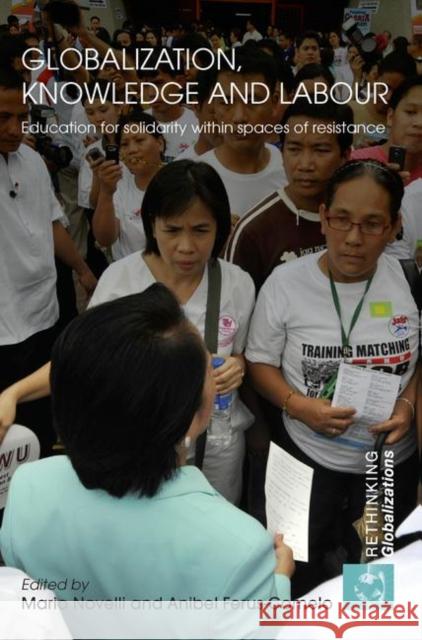Globalization, Knowledge and Labour: Education for Solidarity within Spaces of Resistance » książka
Globalization, Knowledge and Labour: Education for Solidarity within Spaces of Resistance
ISBN-13: 9780415436632 / Angielski / Twarda / 2009 / 14 str.
Globalization, Knowledge and Labour: Education for Solidarity within Spaces of Resistance
ISBN-13: 9780415436632 / Angielski / Twarda / 2009 / 14 str.
(netto: 746,32 VAT: 5%)
Najniższa cena z 30 dni: 730,42
ok. 16-18 dni roboczych.
Darmowa dostawa!
This book begins from the central premise that progressive social change requires collective struggle underpinned by a clear strategy, and that processes of neoliberal globalisation have altered the cartography upon which social struggle takes place. Drawing on insights from the knowledge production processes of labour movements around the world, this research seeks to highlight the central importance of knowledge production and processes of learning within social movements. Providing both a comprehensive theoretical and empirical introduction to the relationship between globalisation, knowledge and social movement strategy, the authors contend that the production and dissemination of alternative knowledge is central to a resurgence of working-class power. By presenting a wide range of case-studies, the book highlights the centrality of knowledge production and circulation processes to the potential expansion and revitalization of the role of civil society in the promotion of social democracy. The chapter contributors include activist-scholars, whose work represents a broad perspective on 'labour' including the unemployed, the self-employed at the margins of the labour market, the unorganized, and those who work in the informal economy. Delivering work which is at once theoretically rich and yet empirically informed, this work will be of interest to students and scholars from a range of disciplines including International Relations, Development Studies, Critical Labour and Social Movement Studies, and Education. It will also be of relevance to activists and practitioners engaged in strategy development and education in various social movements.
Knowledge is playing an important role in the development of contemporary capitalism yet little is known of how labour movements produce, disseminate and utilise knowledge and how that in turn informs strategy and effects outcomes.
This book seeks to redress this balance through the production of a theoretically informed yet richly empirical edited collection that raises the question of how labour movements learn, what strategies they deploy to defend their interests and to what extent processes of neoliberal globalisation and the new geography of global capitalism are producing alternative geographies of labour knowledge production and practice.
The authors argue that the production and dissemination of alternative knowledge is central to a resurgence of working-class power. Worker education in different forms and through different organisational settings is proving to be indispensable to counter-hegemonic labour movements seeking to defend and extend workers rights. Through a series of in-depth case studies from around the globe, this book will illustrate the importance of knowledge for raising the political consciousness of workers and their allies in the fight for social and economic justice. Developing from Santos’s notion of the ‘South’ as a metaphor for all those left out of the benefits of contemporary capitalism, case studies will be drawn from workers movements in both the geographical South and North.











